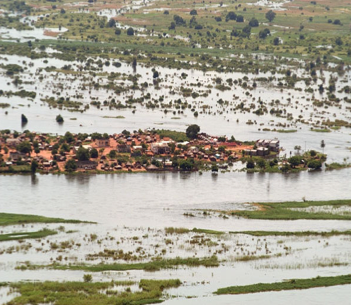Mozambique National Adaptation Programme of Action (NAPA)
Project Overview
National Adaptation Programmes of Action (NAPAs) provide a process for Least Developed Countries (LDCs) to identify priority activities that respond to their immediate needs to adapt to climate change, ultimately leading to the implementation of projects aimed at reducing the economic and social costs of climate change.
Climate Related Hazards identified in Mozambique's National Adaptation Programme of Action (NAPA) include:
- Droughts
- Floods
- Temperature
- Extreme events
Project Details
The government of Mozambique recognizes that the country is vulnerable to catastrophes and that the hazards resulting from climate change are some of the factors that aggravate the situation of absolute poverty in Mozambique. With those challenges in mind, the government has developed the following priority objectives: Reduce the number of human victims and the loss of properties; Promote a culture of prevention; and; Provide the country with the means for prevention and mitigation. Mozambique is placing special emphasis on the prevention of natural disasters and improving early warning systems. Adaptation measures are being implemented in the agricultural, fisheries, energy, environmental and water sectors, with particular attention being paid to the coastal zones and erosion control.
Mozambique is one of the poorest countries in the world and one of the most frequently and worst affected by natural disasters, the majority of which have a direct link to climate change and seem to form part of the El Niño- Southern Oscillation (ENSO). Droughts over consecutive years during El Niño phases alternate with severe flooding during their “El Niña” counterparts. For the future extremely variable climatic conditions including increased frequency of cyclones from the Indian Ocean are predicted, as well as rising land temperatures.
Mozambique is only slowly recovering from 16 years of civil war, which ended in 1992. Life expectancy is around 40 years, with an illiteracy rate of above 50 percent. 78.4 percent of the population live off less than two US dollars a day. The country is ranked 168th out of 177 on the United Nations Development Programme (UNDP)Human Development Index, and is among the world’s top ten hotspots for floods, droughts and cyclone disasters. Most of the 150,000 people living in the Búzi district of the central province of Sofala depend on subsistence farming.
The success or failure of their crops is strongly influenced by the behaviour of the Búzi river and its main affluents. At its highest point, the district lies 130 m above sea level, but large proportions of the coastal area are below sea level and are frequently inundated. Floods threaten lives and an already precarious food supply.
In spring 2000 the highest amounts of precipitation for 50 years, in combination with four cyclones, led to a flood disaster of unknown extent which killed around 800 and directly affected 4.5 million people.
Climate Related Hazards
- Droughts
- Floods
- Temperature
- Extreme events
Main Human Vulnerabilities and Livelihood Impacts
- Droughts
- Loss of crops
- Drying of water sources (wells, lakes, streams, rivers, etc.)
- Reduction of primary productivity in coastal zones, negatively affecting fisheries
- Reduction of grazing areas
- Increase in the price of agricultural products and basic foodstuffs
- Increase of food imports
- Increase in appeals for external aid
- Loss of human and animal lives
- Outbreak of diseases
- Loss of biodiversity
- Floods
- Inundations
- Loss of lives and property
- Loss of crops
- Outbreak of diseases
- Displacement of people
- Loss of biodiversity
- Disruption of normal activities
Key Results and Outputs
Priority Adaptation Projects
- Strengthening of early warning system
- Strengthening of capacities of agricultural producers to deal with climate change
- Reduction of the impact of climate change in coastal zones
- Management of Water resources under the framework of climate change




